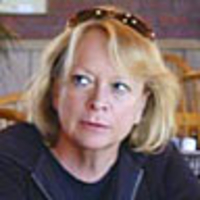
I approached Andrea Levy’s new novel, The Long Song, as a fan of Small Island, her fourth novel and her first published in the U.S. (In a starred Kirkus review, I called it “an enthralling tour de force that animates a chapter in the history of empire.”) The quartet of voices Levy orchestrated—Hortense and Gilbert, a Jamaican born Royal Air Force volunteer and his teacher wife; Queenie, their landlord in 1948 London, and her husband Bernard, returned from the war after being presumed dead—have had staying power. Small Island won England’s 2004 Orange Prize for fiction, the 2004 Whitbread Prize novel award and book of the year award. The BBC miniseries just aired on Masterpiece Theater. I looked forward to meeting her, but our plans to chat in person fell through when the Icelandic volcanic ash played havoc with her May book tour in the U.S., so we shared an email dialogue.
“I do feel strongly that modern racism is a legacy of slavery. That pernicious, pseudo-scientific racism was something that Europeans had to invent.”
Levy, who was born in London of Jamaican parents, explored her own heritage and the intimate links between Britain and the Caribbean, in particular the experience of her parents’ generation, in Small Island and her three earlier novels. What led to The Long Song? “So after that I began to ask that awkward question ‘Why were black people in the Caribbean in the first place?’” she explained. “The answer of course was slavery—they were brought there against their will. So, was I going to write a book about slavery? Not if I could help it. It felt like too shocking and difficult a subject for me.
Then she attended a conference on the legacy of slavery in London. “A young black British woman got up and asked the poignant question—how could she be proud of her heritage knowing that her ancestors had been slaves? She was ashamed of this. Had she never heard the sentiments that a Jamaican friend of mine once told me, ‘If you survived the slave ships, you were strong, if you survived the plantations you were clever?’ Then I thought, maybe I could tell her a story—a story about people who were much more than simply slaves, a story that could change that young woman’s mind and make her proud of her slave heritage. And the seeds for The Long Song were sown.”

Why did she turn to fiction to tell the truths she explores in The Long Song? “Because sometimes history fails us, and all we have left is fiction. Three hundred years of history—the history of the enslaved people of the Caribbean—are missing from the record. Just a big black hole.
“America has its own traumatic and well-documented history with slavery,” she added. “Through books, films and history books, it’s the American story that we in Britain know even better than our own Caribbean history of slavery. But in many respects the two stories are very different. In writing The Long Song, I wanted to look closely at the particularities of life in Jamaica before and after emancipation.”
The Long Song, an eloquent and often satiric novel, is framed as a narrative written at the urging of her son by the elderly July, who was born to a field slave mother and an overseer father on a sugar plantation in Jamaica in the 1830s. As a child of 8, July is taken into the plantation house and renamed “Marguerite” by an English widow, Caroline Mortimer. As an adult, she has her own relationship with an overseer.
What resources were available for Levy in researching The Long Song? “Ironically the most revealing sources for me were the copious books and journals of white residents and visitors to Jamaica in the 19th century. Planters, administrators, merchants, missionaries—they all waxed lyrical on the trials and tribulations of living alongside the ‘negroes.’ A book written by Mrs. Carmichael, the wife of a Scottish planter, Domestic Manners and Social Customs of the White, Coloured and Negro Populations of the West Indies, was a rich resource for me. The combination of her naiveté and her verbose detail made it easy to glimpse the reality of day-to-day life on a sugar plantation.”
Levy extrapolated the life of Jamaica’s slaves from these documents by reading between the lines. “Once I had tuned in to the prejudices and the weird worldview of these white people of the time, I found it was possible to ‘flip the picture’ and stare back at these testimonies from the point of view of the people they were describing.”
There are very few documents from the British Caribbean describing plantation life from the point of view of the enslaved. (The only one Levy mentions in her acknowledgments is The History of Mary Prince, A West Indian Slave. Related by Herself.) Did she also delve she into the literature of slave narratives in her research?
“Slave narratives from the Caribbean were a problem for me for two reasons. Firstly, as I’ve said, there just aren’t enough of them. America has more, I think. But for the Caribbean there are just too few. One person’s testimony is just one person. It isn’t enough to safely feel that you can understand a more general life. And the ones that do exist tend to have been produced and mediated through the British abolitionist movement of the time. This means that they are tailored to a political cause aimed at changing white public opinion. What I wanted to do was to recreate the ordinary life and culture of enslaved people above and beyond their mere slave status. For this I found I just had to use my imagination.”
She also went to Jamaica to see for herself the contrast between the planters’ quarters and the slave village in the scrublands.
“My visit to an old sugar plantation in Jamaica was a very crucial part of being able to imagine the story into existence. It gave me the geography and all the sights and sounds I needed to have in my head. I wasn’t going to get that from sitting in my room in Crouch End (North London). It was also a very moving experience. The old planter’s ‘Great House’ was, as you would imagine, carefully preserved for visitors complete with its sumptuous Georgian furnishings. The old slave quarters, by contrast, I had to locate on an old plan of the estate. There was nothing there but a bumpy patch of ground. Then I looked down. The earth was scattered with broken bits of pottery—fragments of earthenware pots, and the occasional shard of blue and white willow pattern crockery.”
In The Long Song, Levy has taken on the postcolonial challenge of giving voice to those who had no voice in history. Did she have any doubts, or moments of regret in the course of writing this novel?
“Yes, trying to imagine into existence those forgotten lives was a strong motivation for me. It’s what persuaded me to write the book in the first place. Of course I did have doubts and moments of regret, but that’s part-and-parcel of writing any novel I think. I must admit though, this was a tough book to write. Immersing myself in the brutal history of the forced-labor sugar-factory called Jamaica was not pleasant. Often my heart sank when I came across another contemporaneous source that I felt I should read. I never wanted The Long Song to read like a misery memoir. I hope it’s an uplifting story.”
How would she compare the racism of 19th-century Jamaica, among whites, and the social snobbery about skin color among the slave population, with contemporary Britain? “I don’t feel able, or inclined, to really compare racisms of the past with those of today. But I do feel strongly that modern racism is a legacy of slavery. That pernicious, pseudo-scientific racism was something that Europeans had to invent. Africans had to be seen as less than human in order to justify enslaving them.”
The end of slavery in Jamaica appeared to be cause for celebration. But as Levy makes clear in The Long Song, the years after emancipation reinstituted many of the practices of the plantation owners. Did she consider inventing a different sort of ending?
“Endings are always arbitrary, false even—as July herself shows us with her own fantasy happy ending that her son forces her to revise. But I think I always had a firm idea of the mood, the note, on which I wanted the book to finish.”
It’s an ending that allows for the possibility of a sequel.
Plus: Check out Book Beast, for more news on hot titles and authors and excerpts from the latest books.
Jane Ciabattari’s work has appeared in Bookforum,The Guardian online, The New York Times, Los Angeles Times, Washington Post, Columbia Journalism Review, among others. She is president of the National Book Critics Circle and author of the short-story collection Stealing the Fire . Recent short stories are online at KGB Bar Lit, Verbsap, Literary Mama and Lost Magazine.






